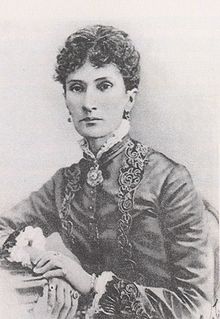4th Symphony (Tchaikovsky)

The Russian composer Pyotr Ilyich Tchaikovsky wrote his Symphony No. 4 in F minor op. 36 in 1877. Parallel to the opera Eugene Onegin , the symphony was written at the time when Tchaikovsky's correspondence with his patroness Nadezhda von Meck began and he fell under the unfortunate marriage with the conservatory student Antonina Ivanovna suffered. Tchaikovsky wrote “our symphony”, which he completed in January 1878, “a mon meilleur ami” (in German: “my best friend”; Ms. von Meck was meant). The symphony was premiered on February 10, 1878 in Moscow ; The conductor was Nikolai Rubinstein .
Structure of the symphony
- Movement: Andante sostenuto - Moderato con anima - Moderato assai, quasi Andante - Allegro vivo
- Movement: Andantino in modo di canzona
- Movement: Scherzo: Pizzicato ostinato - Allegro
- Movement: Finale: Allegro con fuoco
The symphony consists of piccolo , 2 flutes , 2 oboes , 2 clarinets , 2 bassoons , 4 horns , 2 trumpets , 3 trombones , tuba , timpani , triangle , cymbals , bass drum and string instruments .
Tchaikovsky's 4th Symphony, which he wrote “with real inspiration from beginning to end” as well as “with love and glowing enthusiasm”, is considered to be the one with the greatest autobiographical proximity of Tchaikovsky's works (to what extent his own program, which he sent to Frau von Meck sent, for which music is binding, but is controversial).
At the beginning of the first movement (which, according to Tchaikovsky, “contains the core of the whole symphony, without a doubt its main idea”), the fanfare of the horns and bassoons announces the inevitable fate . The happiness suggested by a waltz theme and a clarinet solo is short-lived. Reprise and execution of this sentence becoming one.
A lyrical solo by the oboe introduces the second movement and is picked up by the orchestra.
A pizzicato by the strings scurries through the third movement and is accompanied by the winds in the recapitulation.
Over the third movement, the fourth movement, which describes a festival, breaks in with a storm . “If you find no cause for happiness in yourself, look to others. Go out among the people, ”advised Tchaikovsky. The fate motif of the first movement reappears ominously, but the folk festival mood returns, unimpressed by it. “Enjoy the joy of others - and life is bearable,” writes Tchaikovsky.
In the fourth movement Tchaikovsky deals with a theme from the overture on three Russian themes by Mili Alexejewitsch Balakirew .
effect
Ms. von Meck wrote a telegram to Tchaikovsky, from whose “tone and words” Tchaikovsky concluded “that you are satisfied with the work”. According to Tchaikovsky, Rubinstein reported “that the symphony was played very well” but said “not a word about its value”.
Today the 4th symphony, along with the 5th and 6th symphonies, are among the most popular of Tchaikovsky's symphonies.
The British rock band Pink Floyd quotes a short sequence from the 4th movement on their album Wish You Were Here (1975). Before the solo guitar starts in the title song , the station search can be heard on a radio, whereby first human voices and then the 3rd and 4th bars from the beginning of the 4th movement can be heard in orchestra.
Discography (selection)
- Leonard Bernstein , Boston Symphony Orchestra , 1957
- Yevgeny Maravinsky , Leningrad Philharmonic Orchestra , 1960
- Gennady Roshdestvensky , The Great Radio Symphony Orchestra of the USSR, 1972
- Herbert von Karajan , Berlin Philharmonic , 1976
- Michail Pletnew , Russian National Orchestra , DGG 459 596 CD 1996
Web links
- 4th Symphony (Tchaikovsky) : Sheet music and audio files in the International Music Score Library Project
- Explanations of the genesis of the 4th symphony including its program from Tchaikovsky's letter to Ms. von Meck (English)
- 4th Symphony Pyotr Ilyich Tchaikovsky (Russian, text)
Individual evidence
- ↑ Orchestra performance of the 4th movement for comparison with the Pink Floyd quote
- ↑ IV. Finale ( Memento from September 23, 2016 in the Internet Archive ) (PDF)